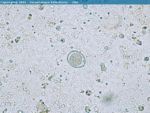Coccidiosis - Dog
Introduction
Coccidiosis in dogs is much rarer than the common disease presentation in ruminants and poultry. Transmission of coccidia is via the faeco- oral route; ingestion of the oocysts.
There are 2 common and 2 less common Isospora species that can occasionally can cause disease in dogs. Often the dog is immunosuppressed or in very poor condition in order for the disease to occur as small numbers of oocysts are not pathogenic. Even if the faecal oocyst count is high, other causes of diarrhoea should be investigated. Both species of Isospora have little pathogenicity.
Clinical Signs
Diarrhoea and weight loss. There may be anorexia and fever in severe cases.
Diagnosis
Presence of a very high number of oocysts in the faeces, plus previous exclusion of other causes of diarrhoea. History of overcrowding or unhygienic condtions may also be indicative.
Treatment and Control
Sulfonamthoxine or Trimethoprin are the treatment of choice in dogs.
Investigation should be undertaken into living conditions of the dog, or pre-existing medical conditions that may make the animal susceptable.
References
Fox, M and Jacobs, D. (2007) Parasitology Study Guide Part 1: Ectoparasites Royal Veterinary College
Hall, E.J, Simpson, J.W. and Williams, D.A. (2005) BSAVA Manual of Canine and Feline Gastroenterology (2nd Edition) BSAVA
Tilley, L.P. and Smith, F.W.K.(2004)The 5-minute Veterinary Consult (Third edition) Lippincott, Williams & Wilkins.
